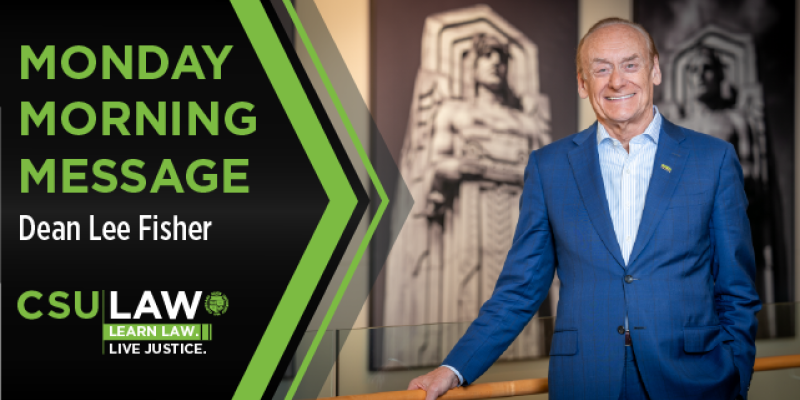
“In our finest hours...the soul of the country manifests itself in an inclination to open our arms rather than to clench our fists; to look out rather than to turn inward; to accept rather than to reject.” ― Jon Meacham, The Soul of America: The Battle for Our Better Angels
I have five thoughts I’d like to share about tomorrow’s election.
First, for our country to begin to heal and for our next President to succeed, we can ill afford a sore loser or an arrogant winner.
I know something about close elections. In 1990 I was elected Ohio Attorney General in the closest statewide election in Ohio history. My margin is easy to remember: 1-2-3-4. It was 1,234 votes out of 3.5 million votes cast, less than one vote per precinct, earning me the nickname, “Landslide Lee.” Under Ohio law, there was an automatic recount, and 6 weeks later, I was declared the winner. But although I was sworn in on January 14, 1991, my opponent filed a lawsuit contesting the election. On March 11, 1991, the Ohio Supreme Court, in an opinion written by Chief Justice Thomas Moyer, ruled unanimously that I could unpack my boxes.
It was a humbling experience. I used to joke that I could walk anywhere in Ohio, talk to any person, and know that there was a good chance that person did not vote for me! That election made me appreciate that there is no such thing as a mandate. Whoever wins, regardless of their electoral college or popular vote margin, would be well-advised to remember that a very significant number of citizens did not vote for them.
Second, the next President inherits a divided country and a dysfunctional, hyper-partisan Congress.
Today, especially in the U.S. House and Senate, far too many of our elected officials talk past each other, deliberately ignoring points of agreement for fear of losing political advantage, and scoring political points with their base supporters rather than trying to find common ground.
Most of us engage in what is called “confirmation bias.” Everything we look for and all that we perceive has a way of proving whatever we believe. That is, we search for and interpret information in a way that confirms our own preconceptions. Rapidly accelerating technology, globalization, and growing racial and cultural diversity–all these things have the capacity to unite us through hope, dignity, and respect, or to tear us further apart through fear, bigotry, and scapegoating.
Third, the next President’s single most important responsibility is not rebuilding the economy. It’s rebuilding the human bridges of a divided nation that is coming apart at its seams.
It’s too simplistic to label the current division in our country as red vs. blue or liberal vs. conservative. We are divided along demographic and geographic fault lines - race, culture, gender, generation, education, income, and rural vs. urban.
Our next President does not have a mandate to ignore, patronize, or stampede the political opposition in order to advance an agenda. The next President must reach out to rivals, critics and skeptics and bring them to their table. Most importantly, our next President must appeal, in President Abraham Lincoln’s words, to“the better angels of our nature.”
Fourth, we must make sure we learn the lessons of January 6, 2021.
Unfortunately, there are some who have already decided that if their candidate wins, the election was fair, and if their candidate loses, the election was unfair. This “heads I win, tails you lose’’ position is unacceptable in a democracy.
Whoever loses the election has the right to challenge the electoral results in courts, but accusations of fraud must be supported by facts and evidence, and if there are irregularities, it must also be proven that they affected the outcome of the election. The lesson of January 6 is that we must uphold the rule of law and protect our long history of peaceful transitions of Presidential power.
Fifth, let’s make the election outcome a teachable moment.
At our law school, regardless of the outcome, I want to do all we can to make the election results a teachable moment. Our law school’s mission, Learn Law, Live Justice, transcends elections.
We seek to be a place where we welcome and celebrate diverse viewpoints but where we share common values. Our first year students took a pledge on their first day of law school to adhere to some core values, among them to conduct themselves with dignity and civility, to treat all people with kindness, courtesy, and respect, to support freedom of speech and diversity of thought, and to disagree respectfully, peacefully, and with an open mind.
Our mission is to educate a new generation of lawyer-leaders who use these core values as their moral compass and who use their special knowledge and skills to make America a place where we strive to find common ground and work for a better common destiny. We strive to graduate future custodians of civility, defenders of democracy, and guardians of justice.
Have a great day and a great week.
The views and opinions expressed in my Monday Morning Message are solely my own and do not reflect the views and opinions of the law school or the university.
For copies of past messages, please go to this link: Monday Morning Messages
Subscribe to Monday Morning Message and CSU|LAW Newsletter
Subscribe to Dean Fisher Living Justice, Living Leadership Podcast
My best,
Lee
Lee Fisher
Dean, Cleveland State University College of Law
Joseph C. Hostetler-BakerHostetler Chair in Law
Chair, American Association of Law Schools (AALS) Section on Leadership
1801 Euclid Avenue, LB 138 |Cleveland, Ohio 44115 -2214
216-386-8688 | lee.fishernull@csuohio.nulledu
